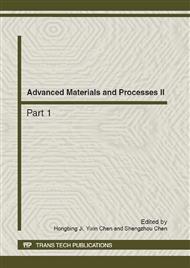[1]
Xie Zhendong, Liu Yongqing. Two Order P-type Learning Control Algorithm of Distributed Parameter Systems. Journal of Jinan University[J], 1998,19(1):60~64.
Google Scholar
[2]
Tian Senping, Xie Shengli, Fu Yuli. Iterative Learning Control Algorithms for Nonlinear Continuous Systems. ACTA SCIENTLARUM NATURALIUM UNIVERSITATIS SUNYATSENI[J], 2000,39(6):313~317.
DOI: 10.1109/icarcv.2004.1468899
Google Scholar
[3]
Xie Shengli, Xie Zhendong,Tian Senping. Iterative Learning Control and Algorithm Realization of Nonlinear Systems. Control Theory & Applications[J], 2002,19(2):167~173.
DOI: 10.1109/icarcv.2004.1468899
Google Scholar
[4]
Tayebi A, and Zaremba MB. Iterative learning control for non-linear systems described by a blended multiple model representation[J]. International Journal of Control, 2002,75(16): 1376~1384
DOI: 10.1080/0020717021000023799
Google Scholar
[5]
Li Yang, Gu Junjie, Zhi Baofeng, Liu Jinkui. Application of the Weighted PD-type Closed-loop Iterative Learning Control in the Repeated Disturbances[J]. Electric Power Science and Engineering, 2008, 24(1): 48~50.
Google Scholar
[6]
Tian Senping, Xie Shengli. A Nonlinear Algorithm of Iterative Learning Control Based on Vector Plots Analysis[C]. Procceedings of the Second International Symposium on Intelligent and Complex Systems, Wuhan, China, October 2001: 17~20
Google Scholar
[7]
Tian Sengping, Xie Shengli, Fu Yuli, Fast Algorithm of Iterative Learning Control[J]. Journal of South China University o f Technology, 2002,30(5):37~40.
Google Scholar
[8]
Qu Z. An iterative learning algorithm for boundary control of a stretched moving string[J]. Automatica, 2002,38(5): 821~827
DOI: 10.1016/s0005-1098(01)00266-7
Google Scholar
[9]
Xie Shengli and Tian Senping. A fast Algorithm of Iterative Learning Control Based on the Geometric Analysis[C]. Proceedings of the 2002 International Conference on Control and Automation, Xiamen, China, Jun. 2002: 472~476
DOI: 10.1109/icca.2002.1229424
Google Scholar
[10]
Xie Shengli, Tian Senping, Xie Zhendong. Fast algorithm of iterative learning control based on geometric analysis[J]. Control Theory & Applications, 2003,20(3):419~422
DOI: 10.1109/icca.2002.1229424
Google Scholar
[11]
Shi Zhongke. Iterative Learning Control Method for Nonlinear Discrete-Time Systems[J]. Control Theory & Applications, 1998,15(3):327~332
Google Scholar
[12]
Zeng Nan, Ying Xingren. ITERATIVE LEARNING CONTROL ALGORITHM FOR LINEAR DYNAMICAL SYSTEM[J]. ACTA AUTOMATICA SINICA, 1992,18(2):168~176.
Google Scholar
[13]
Gao Weihua, Xie Jianying. Closed-Loop Iterative Learning Control for General Nonlinear Discrete System[J]. JOURNAL OF SYSTEM SIMULATION, 2001,13(1):73~74
Google Scholar


